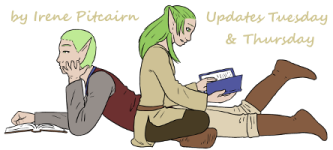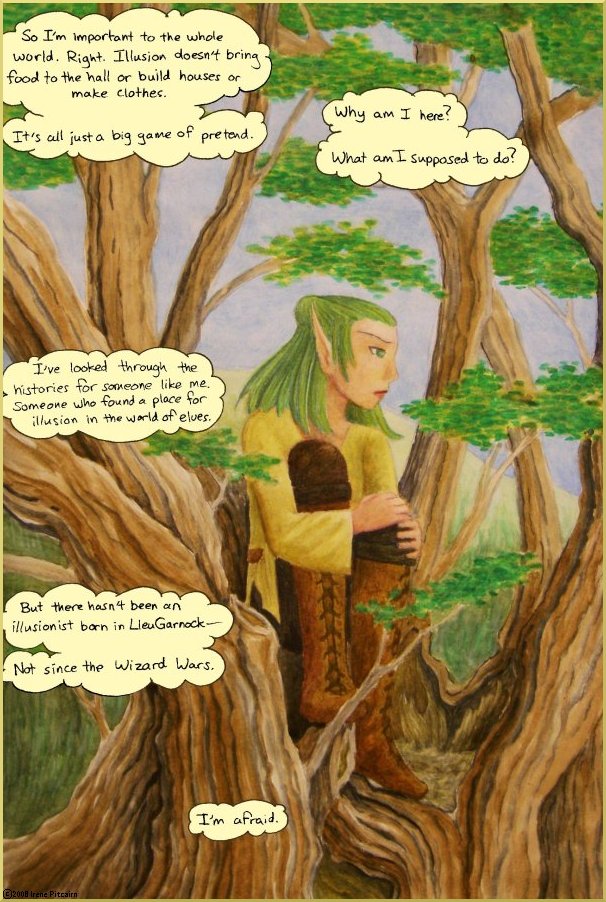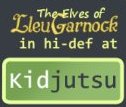


| MAR | Apr 2008 | MAY | |||||
| 30 | 31 | 1 | 2 | 3 | 4 | 5 | |
| 6 | 7 | 8 | 9 | 10 | 11 | 12 | |
| 13 | 14 | 15 | 16 | 17 | 18 | 19 | |
| 20 | 21 | 22 | 23 | 24 | 25 | 26 | |
| 27 | 28 | 29 | 30 | 1 | 2 | 3 | |
| 4 | 5 | 6 | 7 | 8 | 9 | 10 | |


Email the author at
qwanderer7+lgc@gmail.com
The Elves of LleuGarnock is Copyright
Irene Wendy Wode 2008-2011. The Elves of
LleuGarnock is hosted on
ComicGenesis, a free webhosting and
site automation service for webcomics.
April 24, '08
You don't have to read this.
It has been suggested to me recently that my comics should perhaps have a more artistic quality to them.This seems an opportune moment to discuss that.
I cannot fault that critic, for, even disregarding the past few comics and their particular lack, she has seen what I can do and the comic does not represent my best work, at least in a strictly "artistic" view. And for many, the medium of paint is so associated with the concept of fine art that they are, to some extent, subconsciously inseparable.
I can paint, in my own way; I've been trained in the classically western style, which focuses on texture, shape, volume, light and shadows, and color. I can paint objects that stand still, landscapes, spoons and things. The way that I can paint does not lend itself to the comic form. A western oil painting takes hours and hours, usually days, especially if you want to portray any kind of facial expression with any kind of subtlety. My trees in the gallery, watercolor-on-black, are a shortcut and take a bit less time. However, my attempt to portray people in this medium was laughable. In the end, I redrew them in my usual way and pasted them over the painted background.
This doesn't mean at all that I have given up striving to add more subtlety to my art within the comic. But I am walking a line between presenting a consistent product, and the experimentation which stretches my abilities. I have done a great deal of experimenting, and I have come to the conclusion that many comic artists have come to - my backgrounds must be drawn as part of the composition in order for the characters to look like they belong, and the best way to add color to the resulting framework is digitally.
Some people dispute the artistic integrity of digital work; I'm not going to talk about that now. Some people do manage to produce hand-painted color comics within a reasonable schedule. I will talk about how they are different from me, and how I am lessening that gap within (and utilizing) the limitation that the comic form places on me.
Artists who work with faster methods of painting have a confidence in their own ability to paint a line that will be right the first time they run the brush over it. This is an eastern artistic sensibility. Paintings from China and Japan are proudly made up of lines that are elegant on their own, and then somehow come together to make something both recognizable and more elegant than the original object.
I've been working for a long time to develop my confidence in lines. I've talked before about my transition from ballpoint pens, which I used as a sketching medium, to a felt-tip pen. There is plenty of evidence in the first few comics of just how awkward that was for me. Recently I bought my first brush-pen, which is like an ink brush with training wheels. Working with the brush-pen is a whole new jump. Because pressure controls the width of the line to a much greater extent than with the felt-tip pen, I am much more aware of the pressure I am applying; and because I do apply so little pressure when drawing a thin line, every little wiggle of my hand shows up; the pen isn't steadied by the paper. I have to learn confidence, so my hand doesn't shake; and I can teach myself even more fine control.
This isn't the only barrier separating me from beautiful, artistic comic pages. One thing I know I need to learn a feel for is composition, not only of the page but of the panel. I've been taught about composition in art classes, and though I understood the concepts in a factual way, I couldn't feel the effect they had on a piece of art. I still can't; most of the rules of composition don't seem to help me. I can't remember them or figure out how to apply them. When I was in art classes, or just drew things for fun, I was hardly ever aware of composition. I simply loved the objects in the pictures, and while I love color and have always been fascinated by texture, I'm coming to realize more often than not that it was the lines that I really saw and was drawn to.
What it really comes down to is the fact that artistically, I use the comic as a reason to work on the things that I am bad at or don't know how to do at all. I've composed hundreds of panels now, and I still can't pull a line with my pen without sketching it six times first, and I still don't know how to apply the rules of composition, but you know, I'm pretty sure I'm getting better at it.
I could just do what I'm already good at, but I really have no interest in painting dead, decomposed landscapes and random bowls of fruit. I want to tell a story, and I'm just trying to figure out the best way to do that. It's all practice, but as an artist I'm sure I'll spend my whole life practicing. So I thought I might as well show everyone what I'm up to.
On a side note, I've also been asked to point people in the direction of what I might consider a badly-drawn webcomic. I'ts a known fact in the online community that many of them exist, but I really don't like giving anyone's website negative attention, and I don't keep records of where to find the really bad comics I come across. The fact is a lot of the worthwhile comics started out as what one might consider badly-drawn.



